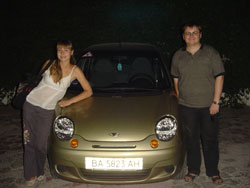 Moscow is the most expensive city in the World – think about this for a second. Not London, New York or Tokyo, but Moscow.
Moscow is the most expensive city in the World – think about this for a second. Not London, New York or Tokyo, but Moscow.
That’s what the recent “Mercer” survey tells us in their annual rankings, and which was widely reported in the media about a month ago. The qualification on this is… “for expatriates” – Mercer’s reports are aimed at corporations who need to establish pay scales for sending their workers abroad.
My own observations, having just spent two weeks in that part of the World are that Moscow is indeed very expensive for anyone coming in from outside. A hotel suite can easily set you back $1000, regular hotel rooms are $350 plus. But it’s property prices throughout the former Soviet States that are the most interesting for me. Property in the former USSR is remarkably expensive, not just for expats, but for everyone.
In Kharkiv for example, a city due south of Moscow and falling just inside Eastern Ukraine, a two bedroom appartment can set you back $200,000. In terms of comparitive earnings, this is equivalent to $800,000 or more by Western standards.
Kharkiv (or Kharkov as it is often written) is not exactly a city most people in the West have ever heard of, and to be fair, is not a place most people would readily choose to live. It has some good universities and a consequently well-educated and entrepreneurial population, but aside from a core of foreign medical students flying in for some of the world’s cheapest medical education, and a few adventurous Austrian tourists flying the new route from their national carrier, it’s a fairly crumbling, tough old place to live.
The reasons for these inflated property prices are complex, I don’t understand all of them, but in several trips there over the last couple of years I’ve started to gain some understanding.
There is a big gulf between the haves and the have-nots. This is probably not news but it’s worth mentioning as it colours everything. Whereas the West, China and India have a burgeoning middle class – on the streets of Kharkiv for example, you will typically only see very expensive cars (late model Lexus / Mercedes), or very old Russian beaters which have been in families for 30 years or more.
A new middle class is developing, but for most people, buying a new car is akin to us buying a new house – it’s a very big deal. Buying a house is not even on the radar.
I suspect that it is richer Moscovites who are driving property prices in former Soviet States to high levels. In a part of the world where a healthy dose of preparedness for anything is an absolute necessity, and diversity of assets a common approach to personal and family security (even if that means simply keeping dollars and roubles under the bed) cities such as Kharkiv offer an outlet of investment.
Supply is an issue too. Given a choice between very old and ill-maintained buildings from centuries of troubled history, or a few modern new buildings from construction companies who simply “can’t get the staff”, these recently enriched buyers from Moscow are funelled into a limited number of options.
The problem with finding construction staff is exacerbated by the fact that half of Eastern Europe has upped and moved to the West following EU acceptance of the likes of Poland, Romania and Bulgaria, and that literally, half the construction staff of those countries have moved to countries like England where they are now in hot demand.
The displacement that is going on as a result of property prices is profound. Polish and Romanian tradesmen move to England, English builders move to Spain or Turkey (thanks to the money they’ve made on their properties in the UK) and a vacuum is left behind in Eastern Europe. This in turn drives prices higher, and it’s toughest most on the people who live there.
A point to make is that we’re not talking about states who have come into the EU – the Ukraine for instance has had none of the benefits of EU membership, but is already feeling the pain. This is probably why one business owner I spoke to was nonplussed about joining the EU – “It will make no difference” he says. Normally business owners are pretty animated about potential EU membership – polarized, but still animated.
Back in Kharkiv, a programmer and his girlfriend show off their brand new car with pride on a night out playing billiards. They may not be able to afford a house yet, but they are doing well by Ukrainian standards.
🙂 nice article 🙂 very interesting and fair :). ps. hello from Kharkov 🙂
and Kharkiv – it is like in Ukrainian language
and Kharkov – russian